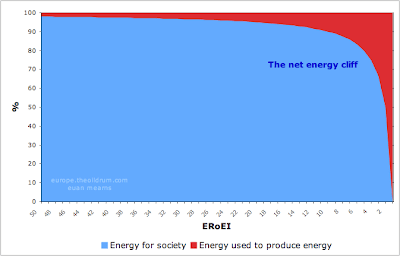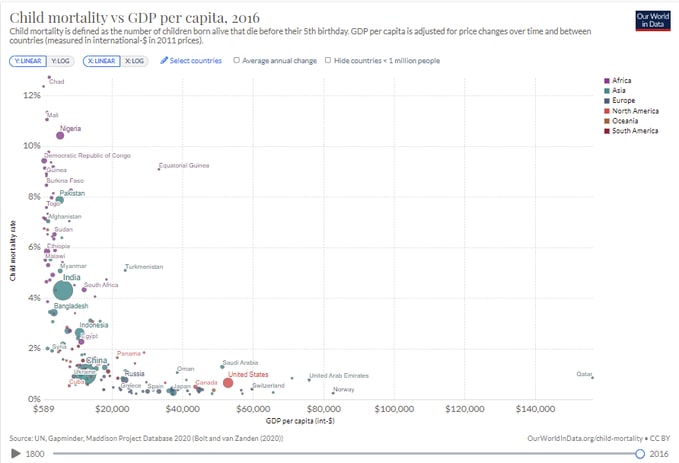I'm sure this is a very unpopular take but I feel obliged to share it: I find the "pausing AI development is impossible" arguments extremely parallel to the "economic degrowth in rich countries is impossible" arguments; and the worse consequences for humanity (and its probabilities) of not doing doing them not too dissimilar. I find it baffling (and epistemically bad) how differently these debates are treated within EA.
Although parallel arguments can be given for and against both issues, EA have disregarded the possibility to degrowth the economy in rich countries without engaging the arguments. Note that degrowthers have good reasons to believe that continued economic growth would lead to ecological collapse --which could be considered an existential risk as, although it would clearly not lead to the extinction of humanity, it may very well permanently and drastically curtail its potential. The EA community has not addressed these reasons, just argued that economic growth is good and that degrowth in rich countries is anyway impossible. Sounds familiar? "AI development is good and stopping it is anyway impossible".
I have this impression since long and I'd have liked to elaborate it it in a decent post, but I don't have the time. Probably I'm not the only one having this impression so I would ask readers to argue and debate below. Especially if you disagree, explain why or upvote a comment that roughly reflects your view rather than downvoting. Downvoting controversial views only hides them rather than confronting them.
[Additions:
I want to make clear that I find the term degrowth misleading and that many people in that movement use terms like a-growth, post-growth, growth agnostics.
I want to thank the users who have engaged and will engage in the discussion! This was the main objective of the post, thanks.]
[Addition 2:
I think this tweet (and Holly's repost) makes the comparison ever more clear.]



Wow, I am wondering whether to engage further or just let your reply stand as a testament to your "thoughtfulness". Doubling down on stereotyping and mischaracterizing people... great job! (sorry for the sarcasm but I am STILL surprised when I encounter this type of behavior in the EA forum, probably a sign of my naivety...). Nevertheless, for the benefit of the people who are intimidated by this type of behavior, I will try to give a short outline on where you, at least in my opinion, go wrong.
First, you seem to be upset that some people believe the hypothesis that "it is possible to organize a transition and live well under a different political-economic system that has a radically smaller resource throughput" because there is no evidence for it. I get that this may be not something you want... from your perspective it may not be "desirable" at the moment but what is your evidence that this is "impossible" to realize or even "undesirable" for people in general? Do you have more than specious historical analogies that actually proof your point? No, you don't because you can't. This is a complex and nuanced question that requires critical engagement and empirical inquiry to be resolved. Nobody is forcing you to contribute to this project but advocating against resolving the issue through critical engagement actually requires critical engagement. Pick your poison.
Second, why on earth do you continue to make broad stereotypical and misrepresenting claims after you have been made aware of the fact that you are doing it? Do you believe that is conducive to a productive and good conversation or are there other reasons in play that I simply fail to apprehend in my naivety and ignorance? Just to illustrate my point, a couple of quotes and replies from my side:
You make it sound like people are against mining of minerals in general. This is not the case. Even people advocating for degrowth have understood that civilization requires mining and use of minerals. They just advocate for being mindful of how much minerals we actually need to mine and encourage reconsideration of how we approach resource extraction in general, from all else being equal "more is better" to "less is better". Mind you that for most people this is also not a dogmatic position but a strategic position that is being taken on the margin in response to a (perceived) overweight of the "more is better" position. In the end, most people who advocate for degrowth now, would settle for a middle ground in the long run, where humanity is simply more mindful with regards to what it is doing. My circumstantial evidence for this is talking to people at academic sustainability conferences.
When people are pointing to limits to growth as a problem, they tend to have a reason for doing so even if one disagrees with them. Figuring out who is right tends to involve debate and empirical inquiry but you again opt for the easy way out and strawman "their" position to prematurely close discussion. What people are pointing to when they say "energy is finite" is not that we could not create "Dyson spheres" sometime in the future but that in our current situation we are still very much dependent on fossil fuels, transitioning to renewables is itself energy and resource intensive, and we don't want to burst our carbon budget while still enabling the Global South to continue its development. These are real issues that must be dealt with in the here and now. What is so wrong with thinking that encouraging Western countries (and their citizens; some degrowth advocates favor bottom-up approaches) to reconsider some of their basic assumptions about growth and prosperity and reduce their material footprint and consumption to help this process along could be part of the solution?
You make it sound like it is a consensus that the "limits to growth" people have been wrong. I can tell you there are quite a few people who would beg to differ. If you would engage with the discourse and look at the data, it's actually surprising how well the original study held up.
But don't let this evidence fool you, your entire hypothesis that we theoretically have enough resource reserves that we can continue to plunder in our ongoing mindless quest for economic growth, (almost) proofs we have nothing to worry or just discuss about. Don't let the fact that we are in an unprecedented situation where we are transitioning entire economies with enormous efforts that are going to take resource, energy, and time disturb you in your certainty and let's simply not use this crisis situation as an opportunity to engage in deep reflection about the values and goals of the economic systems that we want to create as a result. Discussing about how we want to work together as humanity is overrated and not at all consequential for the long-run development of our species. That's explicitly not what EA is supposed to be about. (Sorry, couldn't resist the sarcasm, again)
If you are looking for some materials to further engage with these debates, I can recommend engaging with the academic literature but also other sources like Nate Hagens podcast. There are many people on there who talk about the very practical issues the degrowth people are concerned about and want to address. There is definitely more of value there than what you give it credit for and this is basically the whole reason that I am complaining so heavily about your style and behavior.
Please don't just go around and attack and dunk on "niche" topics you haven't taken the time to properly engage with. It's fine to have (strong) opinions but be mindful of the effects the way you talk about things can have on other people and the community around you. The EA forum needs a diversity of voices and people should feel empowered to raise their (constructive, honest, etc.) points even if not everyone automatically gets their relevance. Constructive criticism and questions are fine and desired but misrepresentations are not. (I acknowledge that I myself am walking a fine line here... but somehow I think a sharp tone is still defensible in this case given the unfolding of the discussion)